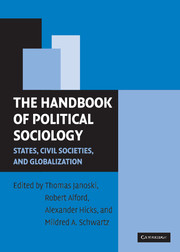Book contents
- Frontmatter
- Contents
- Preface
- Contributors
- Political Sociology in the New Millenium
- PART I THEORIES OF POLITICAL SOCIOLOGY
- PART II CIVIL SOCIETY: THE ROOTS AND PROCESSES OF POLITICAL ACTION
- PART III THE STATE AND ITS MANIFESTATIONS
- PART IV STATE POLICY AND INNOVATIONS
- 25 Comparative and Historical Studies of Public Policy and the Welfare State
- 26 Women, Gender, and State Policies
- 27 The Politics of Racial Policy
- 28 War, Miltarism, and States
- PART V GLOBALIZATION AND POLITICAL SOCIOLOGY
- References
- Name Index
- Subject Index
28 - War, Miltarism, and States
The Insights and Blind Spots of Political Sociology
Published online by Cambridge University Press: 05 June 2012
- Frontmatter
- Contents
- Preface
- Contributors
- Political Sociology in the New Millenium
- PART I THEORIES OF POLITICAL SOCIOLOGY
- PART II CIVIL SOCIETY: THE ROOTS AND PROCESSES OF POLITICAL ACTION
- PART III THE STATE AND ITS MANIFESTATIONS
- PART IV STATE POLICY AND INNOVATIONS
- 25 Comparative and Historical Studies of Public Policy and the Welfare State
- 26 Women, Gender, and State Policies
- 27 The Politics of Racial Policy
- 28 War, Miltarism, and States
- PART V GLOBALIZATION AND POLITICAL SOCIOLOGY
- References
- Name Index
- Subject Index
Summary
Had this chapter been written a quarter of a century ago, it would have been a lengthy lament over the silence of political sociology on the topic of war. But such a focus would ring hollow at this time. It is now taken for granted that states wage war and that war making has molded the histories of states and politics more generally. This is more than a grudging and half-hearted acknowledgment. In fact, war figures prominently when leading sociologists paint with a broad brush. Consider these examples:
In a sweeping history of social power, Michael Mann (1986, 1993) distinguishes the military from other networks of power and explains how military power has been interwoven with cultural, economic, and political power throughout human history. Among other insights, Mann points out that states, not classes and not firms, declare and wage war. As war is waged, the state is transformed as are other social institutions and the relations among them.
Charles Tilly (1975, 1990) points out that the twentieth century was the bloodiest in human history – and provides little reason to assume that wars will decline in ferocity or importance. Moreover, if political sociology is to come to terms with (let alone anticipate) historically important political transformation, wars are a central issue.
Randall Collins (1981, 1995) focused on the geopolitical to assess the durability of states. Based on this assessment, especially its unmanageable strategic liabilities, he was one of few social scientists to predict the collapse of the Soviet Union.
[…]
- Type
- Chapter
- Information
- The Handbook of Political SociologyStates, Civil Societies, and Globalization, pp. 566 - 584Publisher: Cambridge University PressPrint publication year: 2003
- 1
- Cited by



